Sunforest | |
|---|---|
| Origin | London, England |
| Genres | Folk • psychedelic folk |
| Years active | 1968-1973 |
| Labels | Decca, Deram, Nova series |
| Past members | Erika Eigen Freya Hogue Terry Tucker |
Sunforest was an American-English psychedelic folk music trio. It was formed in 1968 by Terry Tucker, Erika Eigen and Freya Hogue. They recorded only one album, Sound of Sunforest , on Decca Records. They are best known for their instrumental musical piece "Overture to the Sun" and their song "Lighthouse Keeper", which were featured on the soundtrack to A Clockwork Orange .
Little is known about the trio [1] but the liner notes of their album and the personal website of Terry Tucker provide some information.
Sunforest began in Washington DC, in the late 1960s. Tucker and Hogue knew each other. Hogue set Tucker's poems to music. After meeting Eigen at a party they wrote songs together. [2]
On Hogue's initiative, and since they thought they had composed enough to perform on stage, the three musicians decided to travel to Europe. In 1969, they moved to London, to take part in the music scene. They took the name "Sunforest". [2] Soon after, they met Vic Coppersmith-Heaven (Vic Smith), a representative of Decca Records. That night they recorded a demo, and two weeks later, Smith became their manager. [1] [3]
Stanley Kubrick wanted to include two pieces in the soundtrack to A Clockwork Orange. He asked for "Overture to the Sun" to be re-recorded. Terry changed the arrangement, and that is the version used in the movie, along with "Lighthouse Keeper". [4] [5]
Starting from 1970, the band mostly performed on stage, in the Marquee Club, [2] [6] in the One World Club, in the crypt of St Martin-in-the-Fields, in the Roundhouse and in The Troubadour, as well as in Italy. [2] This lasted for about 3 years. [7] When Eigen left, the group dissolved. [2]
Terry Ann Tucker [a 1] (vocals, piano, pump organ, harpsichord and Hammond organ) has a diploma from the liberal arts college of West Virginia Wesleyan. This is where she discovered her love for early music and renaissance music. [8] [3]
Freya Lynn Hogue (vocals, classical guitar, banjo) studied classical guitar with Sophocles Papas. [8] [3] She died [9] December, 2016 in Seattle, WA aged 77.
Erika Melita Eigen (vocals, percussion) has no specific musical education. She drew the illustration on the sleeve of Sound of Sunforest. [8] [3]
Footnotes:
References:
The group performed around London and occasionally in Europe for about three years.
Trapeze were an English rock band from Cannock, Staffordshire. Formed in 1969, the band originally featured former The Montanas members John Jones and Terry Rowley (keyboards), and former Finders Keepers members Glenn Hughes, Mel Galley and Dave Holland (drums). Jones and Rowley left the band following the release of their self-titled debut album in 1970, with the lineup of Hughes, Galley and Holland continuing as a trio. After the release of Medusa later in 1970 and You Are the Music... We're Just the Band in 1972, Hughes left Trapeze in 1973 to join Deep Purple.

Trapeze is the debut studio album by British rock band Trapeze. Recorded in 1969 at Morgan Studios and Decca Studios, it was produced by the Moody Blues bassist John Lodge and released in May 1970 as the second album on Threshold Records, a record label founded by Lodge's band. Trapeze is the band's only album to feature founding member John Jones ; both he and Terry Rowley left shortly after its release.
The Lighthouse Keepers, initially the Light-Housekeepers, were an Australian country and indie pop band formed in 1981 in Canberra. In November 1984 the group issued their debut studio album, Tales of the Unexpected, and a single, "Ocean Liner". In 1985 the band toured the United Kingdom supporting Hot label mates, The Triffids. The Lighthouse Keepers combined a "loosely rehearsed, casual ethos" with humour, punk attitudes and pure pop song craft. The ensemble disbanded in 1986, releasing a compilation album, Imploding, in November that year. According to rock music historian, Ian McFarlane, their "tasteful, jangly brand of country-tinged folk rock was at odds with prevailing trends on Sydney's early 1980s, Detroit-besotted independent scene. The band nevertheless issued a number of albums and singles, and always lived up to audience expectations".

Marmalade are a Scottish pop rock band originating from the east end of Glasgow, originally formed in 1961 as The Gaylords, and then later billed as Dean Ford and the Gaylords, recording four singles for Columbia (EMI). In 1966 they changed the band's name to The Marmalade and were credited as such on all of their subsequent recorded releases with CBS Records and Decca Records until 1972. Their greatest chart success was between 1968 and 1972, placing ten songs on the UK Singles Chart, and many overseas territories, including international hits "Reflections of My Life", which reached No. 10 on the US Billboard Hot 100 Chart and No. 3 on the UK chart in January 1970, and "Ob-La-Di, Ob-La-Da", which topped the UK chart in January 1969, the group becoming the first-ever Scottish artist to top that chart.

Cyril Davies was an English blues musician, and one of the first blues harmonica players in England.
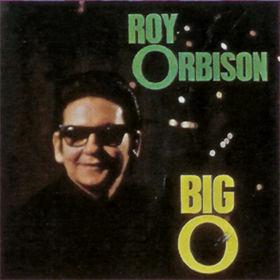
The Big O is the fifteenth music album recorded by Roy Orbison, and according to the authorised Roy Orbison biography, his second for London Records in the United Kingdom. The music and backing vocals were provided by English group, the Art Movement on all tracks except for "Penny Arcade", which was a studio recording and was released as a single in 1969, peaking at No. 27 in the UK and was Orbison's last UK chart success during his lifetime. "Penny Arcade" was also his biggest hit in Australia, spending four weeks at number one around Christmas 1969. The second single, "Break My Mind", was Orbison's last Australian chart success during his lifetime, reaching #24 in March 1970. The album was released in Europe in early 1970.

A Clockwork Orange is a 1971 dystopian crime film adapted, produced, and directed by Stanley Kubrick, based on Anthony Burgess's 1962 novel. It employs disturbing and violent themes to comment on psychiatry, juvenile delinquency, youth gangs, and other social, political, and economic subjects in a dystopian near-future Britain.

Vital: Van der Graaf Live is the first live album by English progressive rock band Van der Graaf Generator. It was recorded 16 January 1978 at the Marquee Club in London and was released in July, one month after the band's 1978 break-up. The album was credited under the abbreviated name Van der Graaf, like the previous year's The Quiet Zone/The Pleasure Dome (1977), and featured the same line-up plus newcomer cellist/keyboardist Charles Dickie, who had officially joined the band in August 1977, and original saxophonist and flautist David Jackson, who re-joined the band for this recording.
Sounds Incorporated, first recorded as Sounds Inc., was a British instrumental pop/rock group which recorded extensively in the 1960s.
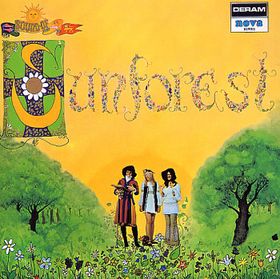
Sound of Sunforest is the first and only studio album by the English psychedelic folk group, Sunforest. The tracks have arrangements with medieval and electric sounds in a psychedelic style. The band's material offered diverse and unique sound; but without a hit single, the album did not sell successfully.
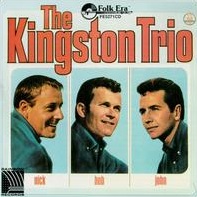
The Kingston Trio (Nick Bob John) (more commonly known as Nick Bob John) is an album by the American folk music group the Kingston Trio, released in 1964 (see 1964 in music). Nick Bob John failed to reach the Top 40, peaking at number 53 on the Billboard Pop Albums chart.
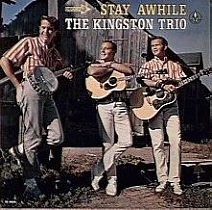
Stay Awhile is an album by the American folk music group the Kingston Trio, released in 1965. It was their second release on the Decca label. It continued their downward slide in the charts, reaching number 126 on the Billboard Pop Albums chart. The single "Yes I Can Feel It" b/w "Stay Awhile" did not chart.
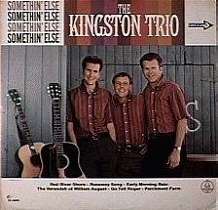
Somethin' Else is an album by the American folk music group the Kingston Trio, released in 1965. It was the first Kingston Trio principal album to miss the charts completely. The lead-off single was "Parchment Farm" b/w "Runaway Song".

Children of the Morning is an album by the American folk music group the Kingston Trio, released in 1966. It was their last album on the Decca label. Three singles were released from the album and all were commercial flops, as was the album. The singles were: "Norwegian Wood" b/w "Put Your Money Away", "The Spinnin' of the World" b/w "A Little Soul is Born" and "Lock All the Windows" b/w "Hit and Run".
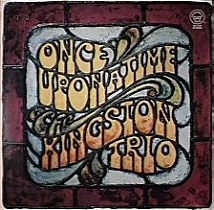
Once Upon a Time is a live album by the American folk music group the Kingston Trio, recorded in 1966 and released in 1969. It was originally released as a double-LP with a three-page booklet and reached number 163 on the Billboard Pop Albums chart. The lead-off single was "One Too Many Mornings" b/w "Scotch and Soda".

The Lost Masters 1969–1972 is an album by the New Kingston Trio, recorded in 1969 to 1972 and released in 1997.
The Montanas were an English 1960s and 1970s pop rock band from Wolverhampton, England. Though they never found significant success in their home country, they had one moderate hit in the United States.
Vic Coppersmith-Heaven is an English sound engineer and record producer, best known for his production work with the Jam.
The Alan Bown Set, later known as The Alan Bown! or just Alan Bown, were a British band of the 1960s and 1970s whose music evolved from jazz and blues through soul and rhythm and blues and ended up as psychedelia and progressive rock. The band achieved limited chart success and is best known for the role it played in developing the careers of numerous musicians including Mel Collins, John Helliwell, Robert Palmer, Jess Roden and Dougie Thomson.

Stanley Kubrick's A Clockwork Orange is a soundtrack album released in 1972 by Warner Bros. Records, featuring music from Stanley Kubrick's 1971 film A Clockwork Orange. It includes pieces of classical music and electronic music by American composer and musician Wendy Carlos, whom Kubrick hired to write the film's original score. Music that Carlos recorded for the film that remained unreleased, including complete tracks, was released three months later on her album Walter Carlos' Clockwork Orange.